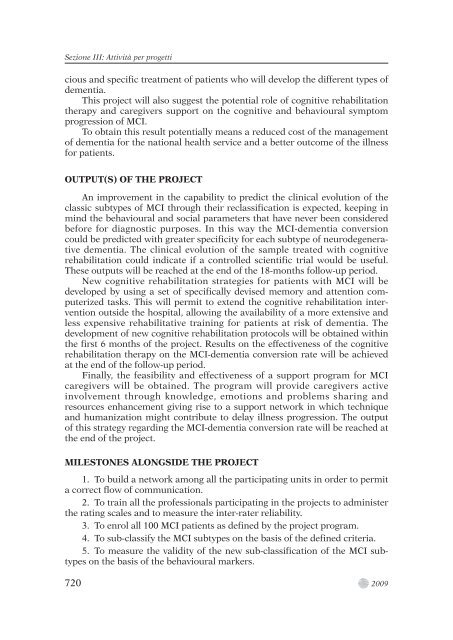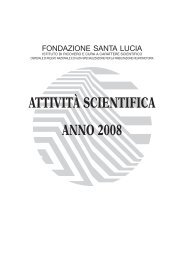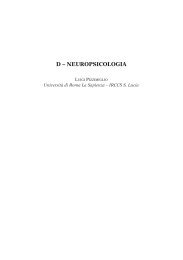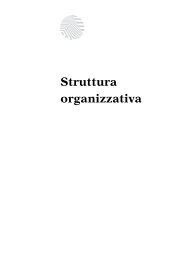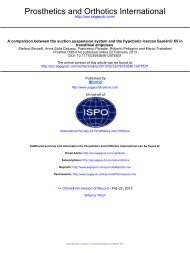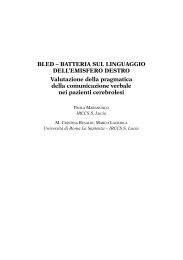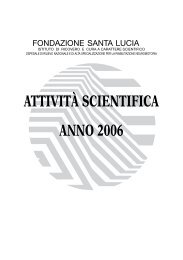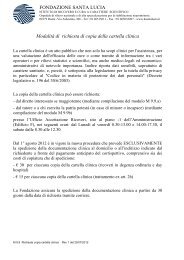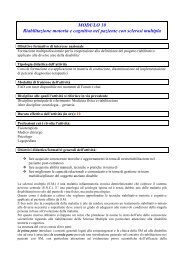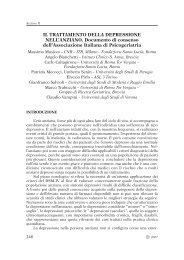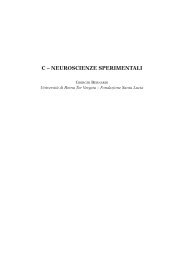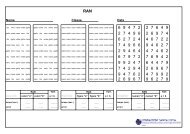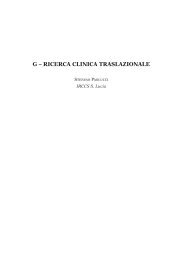- Page 1 and 2:
FONDAZIONE SANTA LUCIA ISTITUTO DI
- Page 3 and 4:
I N D I C E Pag. PRESENTAZIONE 1 SE
- Page 5 and 6:
Indice - CAMPUS.1 - Analysis of dev
- Page 7 and 8:
PRESENTAZIONE
- Page 9 and 10:
Presentazione IRCCS, Università ed
- Page 11 and 12:
Presentazione selezione dei contrib
- Page 13 and 14:
Dati planimetrici
- Page 15 and 16:
Dati planimetrici SEDE DI VIA ARDEA
- Page 17 and 18:
Fondazione Santa Lucia Via Ardeatin
- Page 19 and 20:
B MAGAZZINO C MENSA - CUCINA F DIRE
- Page 21 and 22:
Dati planimetrici quali la corretta
- Page 23 and 24:
Dati planimetrici audiovisivi, chia
- Page 25 and 26:
Dati planimetrici Figura 3 La desti
- Page 27 and 28:
Dati planimetrici I volumi degli im
- Page 29 and 30:
GRANDE RACCORDO ANULARE KM 51 Fosso
- Page 31 and 32:
Struttura organizzativa
- Page 33 and 34:
Comitato Etico: Fiorenzo Angelini M
- Page 35 and 36:
Servizi socio-sanitari Assistente s
- Page 37 and 38:
Laboratori e servizi di ricerca Neu
- Page 39 and 40:
Struttura organizzativa prese a mag
- Page 41 and 42:
Struttura organizzativa di Amminist
- Page 43 and 44:
Struttura organizzativa Coadiuva il
- Page 45 and 46:
Struttura organizzativa - libro del
- Page 47 and 48:
Struttura organizzativa di procedur
- Page 49 and 50:
Struttura organizzativa rare il col
- Page 51 and 52:
Struttura organizzativa comunicare
- Page 53 and 54:
Struttura organizzativa Allegato 1
- Page 55 and 56:
Struttura organizzativa Allegato 2
- Page 57 and 58:
Struttura organizzativa Giova, infi
- Page 59 and 60:
Struttura organizzativa A seconda d
- Page 61 and 62:
Struttura organizzativa MODULO CONS
- Page 63 and 64:
Struttura organizzativa 2) Con rife
- Page 65 and 66:
Sezione I DEGENZE Quadro generale 2
- Page 67 and 68:
PAZIENTI DIMESSI PER TIPOLOGIA DI R
- Page 69 and 70:
PAZIENTI DIMESSI PER TIPOLOGIA DI R
- Page 71 and 72:
Sezione I TRATTAMENTI RIABILITATIVI
- Page 73 and 74:
Sezione I Sin dall’inizio della s
- Page 75 and 76:
Sezione I 2. Razionalizzazione degl
- Page 77 and 78:
SEZIONE II
- Page 79 and 80:
Sezione II La Fondazione Santa Luci
- Page 81 and 82:
Sezione II - Collège de France:
- Page 83 and 84:
Sezione II Art. 7 - Il presente acc
- Page 85 and 86:
Sezione II - che in questo quadro l
- Page 87 and 88:
Sezione II uniformarsi ai regolamen
- Page 89 and 90:
Sezione II ACCORDO DI COLLABORAZION
- Page 91 and 92:
Attività didattica e formativa
- Page 93 and 94:
Attività didattica e formativa - U
- Page 95 and 96:
EF - Daniela Morelli - “ L’ICF
- Page 97 and 98:
Attività didattica e formativa der
- Page 99 and 100:
Attività didattica e formativa que
- Page 101 and 102:
Attività didattica e formativa SI
- Page 103 and 104:
Attività didattica e formativa dal
- Page 105 and 106:
Attività didattica e formativa A n
- Page 107 and 108:
Attività didattica e formativa Con
- Page 109 and 110:
Attività didattica e formativa zio
- Page 111 and 112:
Attività didattica e formativa vid
- Page 113 and 114:
Sezione II - Alterazioni morfologic
- Page 115 and 116:
Sezione II ALTERAZIONI MORFOLOGICHE
- Page 117 and 118:
Sezione II copy number variations)
- Page 119 and 120:
Sezione II tica D2R osservata nei t
- Page 121 and 122:
Sezione II splicing. In seguito, pe
- Page 123 and 124:
Sezione II inibitorie e glutammater
- Page 125 and 126:
Sezione II processi metabolici e in
- Page 127 and 128:
Sezione II Questi dati suggeriscono
- Page 129 and 130:
Sezione II moli. Per questo motivo
- Page 131 and 132:
Sezione II Conclusioni - Da questi
- Page 133 and 134:
Sezione II mente GFP. Infatti, in q
- Page 135 and 136:
Sezione II Microscopia confocale -
- Page 137 and 138:
Sezione II l’ambiente. Nello spec
- Page 139 and 140:
Sezione II leggi fisiche imposte da
- Page 141 and 142:
Sezione II rale identico a quello d
- Page 143 and 144:
Sezione II RUOLO DELL’IMMAGINAZIO
- Page 145 and 146:
Sezione II parametrica (mentre è n
- Page 147 and 148:
Sezione II I risultati hanno mostra
- Page 149 and 150:
Sezione II danno stesso, ma anche c
- Page 151 and 152:
Sezione II Discussione - Il TP10 ha
- Page 153 and 154:
Sezione II molto complessi. L’ins
- Page 155 and 156:
Sezione II PROFUNDISTANCE: UNA BANC
- Page 157 and 158:
Sezione II resistenza all’apoptos
- Page 159 and 160:
Sezione II tion” (LTP) e “long
- Page 161 and 162:
Sezione II intermedie di traduzione
- Page 163 and 164:
Sezione II una maggiore età e un m
- Page 165 and 166:
Sezione II tati 16 pazienti (13 mas
- Page 167 and 168:
Sezione II et al. (2008) Magn Reson
- Page 169 and 170:
Sezione II Viviana Versace, Massimi
- Page 171 and 172:
Sezione II Risultati - L’analisi
- Page 173 and 174:
Sezione II gico mediante Risonanza
- Page 175 and 176:
Sezione II Da anni la Fondazione Sa
- Page 177 and 178:
Sezione II 22/4 Convegno, Dr. Fabri
- Page 179 and 180:
Sezione II 19/11 Seminario, Prof.ss
- Page 181 and 182:
Sezione II Sostanziale attività ch
- Page 183 and 184:
Sezione II Studio dei cambiamenti e
- Page 185 and 186:
Sezione II Sviluppo di un protocoll
- Page 187 and 188:
Sezione II variazioni delle struttu
- Page 189 and 190:
Sezione II ANNO DI ATTIVAZIONE 2008
- Page 191 and 192:
Sezione II Decorso temporale della
- Page 193 and 194:
Sezione II Implementazione di un pr
- Page 195 and 196:
Sezione II Trattamento riabilitativ
- Page 197 and 198:
Sezione II Valutazione neurofisiolo
- Page 199 and 200:
Sezione II corso terapeutico. 2) Cr
- Page 201 and 202:
Sezione II Valutazione, caratterist
- Page 203 and 204:
Sezione II CARTELLA CLINICA NUTRIZI
- Page 205 and 206:
Sezione II MALNUTRIZIONE IN PAZIENT
- Page 207 and 208:
Sezione II STANDARD PER UNA CORRETT
- Page 209 and 210:
Sezione II 11. Torace (Marco Speran
- Page 211 and 212:
Sezione II PRODUTTIVITÀ SCIENTIFIC
- Page 213 and 214:
Sezione II - Clin Dermatol 2,377 1
- Page 215 and 216:
Sezione II - Mov Disord 3,898 5 - M
- Page 217 and 218:
Sezione II 8AMMATUNA E, DIVONA M, C
- Page 219 and 220:
Sezione II The PRIAMO study: a mult
- Page 221 and 222:
Sezione II 38 BRECCIA M, LATAGLIATA
- Page 223 and 224:
Sezione II 57 CATANZARO G, RAPINO C
- Page 225 and 226:
Sezione II brain of a transgenic mo
- Page 227 and 228:
Sezione II 91 DAPRATI E, NICO D, DU
- Page 229 and 230:
Sezione II Diagnosis and management
- Page 231 and 232:
Sezione II 121 FEDERICI M, NISTICÒ
- Page 233 and 234:
Sezione II 139 GHIGLIERI V, PICCONI
- Page 235 and 236:
Sezione II 157 KASPER S, HERMAN B,
- Page 237 and 238:
Sezione II 171 LOIARRO M, GALLO G,
- Page 239 and 240:
Sezione II 190 MANDOLESI L, FOTI F,
- Page 241 and 242:
Sezione II 207 MOREAU C, DEFEBVRE L
- Page 243 and 244:
Sezione II 226 PAPAGNO C, CAPASSO R
- Page 245 and 246:
Sezione II Autosomal recessive here
- Page 247 and 248:
Sezione II 257 ROSSI S, FURLAN R, D
- Page 249 and 250:
Sezione II 275 SEVERINI C, LA CORTE
- Page 251 and 252:
Sezione II 291 TANTUCCI M, MARIUCCI
- Page 253 and 254:
Sezione II 309 ZAGO M, IOSA M, MAFF
- Page 255 and 256:
Sezione II Normal versus pathologic
- Page 257 and 258:
Sezione II 6COSTA C, PISANI F, IENT
- Page 259 and 260:
Sezione II c) Pubblicate su atti co
- Page 261 and 262:
Sezione II 6BORRONI B, GRASSI M, AR
- Page 263 and 264:
Brevetti
- Page 265 and 266:
Brevetti mente stabilità e mobilit
- Page 267 and 268:
Brevetti flessibile (3), tra la bar
- Page 269 and 270:
Brevetti USO DEI MUTANTI DOMINANTI
- Page 271 and 272:
Brevetti che manca dell’attività
- Page 273 and 274:
- La Figura 5 mostra l’accumulo d
- Page 275 and 276:
Brevetti strando che il legame all
- Page 277 and 278:
Brevetti tivo di SMN2 in condizioni
- Page 279 and 280:
Brevetti contenenti 0.1% Tween 20.
- Page 281 and 282:
Brevetti 41. Baughan T, Shababi M,
- Page 283 and 284:
Brevetti Fig. 1c Fig. 1d Fig. 1e Fi
- Page 285 and 286:
Brevetti Fig. 2c 2009 287
- Page 287 and 288:
Brevetti Fig. 4a Fig. 4b 2009 289
- Page 289 and 290:
SEZIONE III
- Page 291 and 292:
Sezione III: Settori di ricerca L
- Page 293 and 294:
LINEE DI RICERCA A. Neurologia clin
- Page 295 and 296:
Sezione III: Attività per linea di
- Page 297 and 298:
Sezione III: Attività per linea di
- Page 299 and 300:
Sezione III: Attività per linea di
- Page 301 and 302:
Sezione III: Attività per linea di
- Page 303 and 304:
Sezione III: Attività per linea di
- Page 305 and 306:
Sezione III: Attività per linea di
- Page 307 and 308:
Sezione III: Attività per linea di
- Page 309 and 310:
Sezione III: Attività per linea di
- Page 311 and 312:
Sezione III: Attività per linea di
- Page 313 and 314:
Sezione III: Attività per linea di
- Page 315 and 316:
Sezione III: Attività per linea di
- Page 317 and 318:
Sezione III: Attività per linea di
- Page 319 and 320:
Sezione III: Attività per linea di
- Page 321 and 322:
Sezione III: Attività per linea di
- Page 323 and 324:
Sezione III: Attività per linea di
- Page 325 and 326:
Sezione III: Attività per linea di
- Page 327 and 328:
Sezione III: Attività per linea di
- Page 329 and 330:
Sezione III: Attività per linea di
- Page 331 and 332:
Sezione III: Attività per linea di
- Page 333 and 334:
Sezione III: Attività per linea di
- Page 335 and 336:
Sezione III: Attività per linea di
- Page 337 and 338:
Sezione III: Attività per linea di
- Page 339 and 340:
Sezione III: Attività per linea di
- Page 341 and 342:
B-METODOLOGIE INNOVATIVE IN RIABILI
- Page 343 and 344:
Metodologie innovative in riabilita
- Page 345 and 346:
Metodologie innovative in riabilita
- Page 347 and 348:
Metodologie innovative in riabilita
- Page 349 and 350:
Metodologie innovative in riabilita
- Page 351 and 352:
ghezza di circa 7 metri ricoperto d
- Page 353 and 354:
Metodologie innovative in riabilita
- Page 355 and 356:
alto e salti con l’asta) ad un va
- Page 357 and 358:
Metodologie innovative in riabilita
- Page 359 and 360:
Metodologie innovative in riabilita
- Page 361 and 362:
Metodologie innovative in riabilita
- Page 363 and 364:
C-NEUROSCIENZE SPERIMENTALI GIORGIO
- Page 365 and 366:
Neuroscienze sperimentali C.2.13 -
- Page 367 and 368:
Neuroscienze sperimentali basale ma
- Page 369 and 370:
Neuroscienze sperimentali che di co
- Page 371 and 372:
Neuroscienze sperimentali C.2 - STU
- Page 373 and 374:
un elevato grado di crosscorrelazio
- Page 375 and 376:
Neuroscienze sperimentali per conve
- Page 377 and 378:
Neuroscienze sperimentali tanza sia
- Page 379 and 380:
Neuroscienze sperimentali Descrizio
- Page 381 and 382:
Neuroscienze sperimentali Nonostant
- Page 383 and 384:
Neuroscienze sperimentali C.2.8 - R
- Page 385 and 386:
Neuroscienze sperimentali costriata
- Page 387 and 388:
Neuroscienze sperimentali sclusione
- Page 389 and 390:
Neuroscienze sperimentali striatali
- Page 391 and 392:
Neuroscienze sperimentali tico poss
- Page 393 and 394:
Neuroscienze sperimentali lulari di
- Page 395 and 396:
Neuroscienze sperimentali sinapsi i
- Page 397 and 398:
Neuroscienze sperimentali simili a
- Page 399 and 400:
Sezione III: Attività per linea di
- Page 401 and 402:
Sezione III: Attività per linea di
- Page 403 and 404:
Sezione III: Attività per linea di
- Page 405 and 406:
Sezione III: Attività per linea di
- Page 407 and 408:
Sezione III: Attività per linea di
- Page 409 and 410:
Sezione III: Attività per linea di
- Page 411 and 412:
Sezione III: Attività per linea di
- Page 413 and 414:
Sezione III: Attività per linea di
- Page 415 and 416:
Sezione III: Attività per linea di
- Page 417 and 418:
Sezione III: Attività per linea di
- Page 419 and 420:
Sezione III: Attività per linea di
- Page 421 and 422:
Sezione III: Attività per linea di
- Page 423 and 424:
Sezione III: Attività per linea di
- Page 425 and 426:
Sezione III: Attività per linea di
- Page 427 and 428:
Sezione III: Attività per linea di
- Page 429 and 430:
Sezione III: Attività per linea di
- Page 431 and 432:
Sezione III: Attività per linea di
- Page 433 and 434:
Sezione III: Attività per linea di
- Page 435 and 436:
Sezione III: Attività per linea di
- Page 437 and 438:
Sezione III: Attività per linea di
- Page 439 and 440:
Sezione III: Attività per linea di
- Page 441 and 442:
Sezione III: Attività per linea di
- Page 443 and 444:
Sezione III: Attività per linea di
- Page 445 and 446:
Sezione III: Attività per linea di
- Page 447 and 448:
Sezione III: Attività per linea di
- Page 449 and 450:
Sezione III: Attività per linea di
- Page 451 and 452:
Sezione III: Attività per linea di
- Page 453 and 454:
Sezione III: Attività per linea di
- Page 455 and 456:
Sezione III: Attività per linea di
- Page 457 and 458:
Sezione III: Attività per linea di
- Page 459 and 460:
Sezione III: Attività per linea di
- Page 461 and 462:
Sezione III: Attività per linea di
- Page 463 and 464:
Sezione III: Attività per linea di
- Page 465 and 466:
Sezione III: Attività per linea di
- Page 467 and 468:
Sezione III: Attività per linea di
- Page 469 and 470:
Sezione III: Attività per linea di
- Page 471 and 472:
Sezione III: Attività per linea di
- Page 473 and 474:
Sezione III: Attività per linea di
- Page 475 and 476:
Sezione III: Attività per linea di
- Page 477 and 478:
Sezione III: Attività per linea di
- Page 479 and 480:
Sezione III: Attività per linea di
- Page 481 and 482:
Sezione III: Attività per linea di
- Page 483 and 484:
Sezione III: Attività per linea di
- Page 485 and 486:
Sezione III: Attività per linea di
- Page 487 and 488:
Sezione III: Attività per linea di
- Page 489 and 490:
Sezione III: Attività per linea di
- Page 491 and 492:
Sezione III: Attività per linea di
- Page 493 and 494:
Sezione III: Attività per linea di
- Page 495 and 496:
Sezione III: Attività per linea di
- Page 497 and 498:
Sezione III: Attività per linea di
- Page 499 and 500:
Sezione III: Attività per linea di
- Page 501 and 502:
Sezione III: Attività per linea di
- Page 503 and 504:
Sezione III: Attività per linea di
- Page 505 and 506:
Sezione III: Attività per linea di
- Page 507 and 508:
Sezione III: Attività per linea di
- Page 509 and 510:
Sezione III: Attività per linea di
- Page 511 and 512:
Sezione III: Attività per linea di
- Page 513 and 514:
Sezione III: Attività per linea di
- Page 515 and 516:
Sezione III: Attività per linea di
- Page 517 and 518:
Sezione III: Attività per linea di
- Page 519 and 520:
Sezione III: Attività per linea di
- Page 521 and 522:
Sezione III: Attività per linea di
- Page 523 and 524:
Sezione III: Attività per linea di
- Page 525 and 526:
Sezione III: Attività per linea di
- Page 527 and 528:
Sezione III: Attività per linea di
- Page 529 and 530:
Sezione III: Attività per linea di
- Page 531 and 532:
Sezione III: Attività per linea di
- Page 533 and 534:
Sezione III: Attività per linea di
- Page 535 and 536:
Sezione III: Attività per linea di
- Page 537 and 538:
Sezione III: Attività per linea di
- Page 539 and 540:
Sezione III: Attività per linea di
- Page 541 and 542:
Sezione III: Attività per linea di
- Page 543 and 544:
Sezione III: Attività per linea di
- Page 545 and 546:
Attività per progetti
- Page 547 and 548:
Sezione III: Attività per progetti
- Page 549 and 550:
Sezione III: Attività per progetti
- Page 551 and 552:
Sezione III: Attività per progetti
- Page 553 and 554:
Sezione III: Attività per progetti
- Page 555 and 556:
Sezione III: Attività per progetti
- Page 557 and 558:
Sezione III: Attività per progetti
- Page 559 and 560:
Sezione III: Attività per progetti
- Page 561 and 562:
Sezione III: Attività per progetti
- Page 563 and 564:
AISLA.1 - VALIDATION OF A COMBINED
- Page 565 and 566:
AISLA.1 - Validation of a combined
- Page 567 and 568:
AISLA.1 - Validation of a combined
- Page 569 and 570:
AISLA.1 - Validation of a combined
- Page 571 and 572:
CAMPUS.1 - ANALYSIS OF DEVELOPMENTA
- Page 573 and 574:
CAMPUS.1 - Analysis of developmenta
- Page 575 and 576:
CAMPUS.1 - Analysis of developmenta
- Page 577 and 578:
CAMPUS.1 - Analysis of developmenta
- Page 579 and 580:
CAMPUS.1 - Analysis of developmenta
- Page 581 and 582:
CAMPUS.1 - Analysis of developmenta
- Page 583 and 584:
CAMPUS.1 - Analysis of developmenta
- Page 585 and 586:
EC.11 - NEUROPROTECTIVE STRATEGIES
- Page 587 and 588:
EC.11 - Neuroprotective strategies
- Page 589 and 590:
EC.11 - Neuroprotective strategies
- Page 591 and 592:
EC.11 - Neuroprotective strategies
- Page 593 and 594:
EC.11 - Neuroprotective strategies
- Page 595 and 596:
EC.13 - MOTIVATING PLATFORM FOR ELD
- Page 597 and 598:
EC.13 - Motivating platform for eld
- Page 599 and 600:
EC.13 - Motivating platform for eld
- Page 601 and 602:
ERANET - CALCIUM HOMEOSTASIS DYSFUN
- Page 603 and 604:
ERANET - Calcium homeostasis dysfun
- Page 605 and 606:
ERANET - Calcium homeostasis dysfun
- Page 607 and 608:
ERANET - Calcium homeostasis dysfun
- Page 609 and 610:
ERANET - Calcium homeostasis dysfun
- Page 611 and 612:
ERANET - Calcium homeostasis dysfun
- Page 613 and 614:
Sezione III: Attività per progetti
- Page 615 and 616:
Sezione III: Attività per progetti
- Page 617 and 618:
Sezione III: Attività per progetti
- Page 619 and 620:
Sezione III: Attività per progetti
- Page 621 and 622:
Sezione III: Attività per progetti
- Page 623 and 624:
Sezione III: Attività per progetti
- Page 625 and 626:
Sezione III: Attività per progetti
- Page 627 and 628:
Sezione III: Attività per progetti
- Page 629 and 630:
Sezione III: Attività per progetti
- Page 631 and 632:
Sezione III: Attività per progetti
- Page 633 and 634:
Sezione III: Attività per progetti
- Page 635 and 636:
Sezione III: Attività per progetti
- Page 637 and 638:
Sezione III: Attività per progetti
- Page 639 and 640:
MERCK.1 - EFFECTS OF INTERFERON b-1
- Page 641 and 642:
MERCK.1 - Effects of interferon b-1
- Page 643 and 644:
MERCK.1 - Effects of interferon b-1
- Page 645 and 646:
ÖSSUR - BENEFICI FUNZIONALI, NEGLI
- Page 647 and 648:
ÖSSUR - Benefici funzionali, negli
- Page 649 and 650:
ÖSSUR - Benefici funzionali, negli
- Page 651 and 652:
ÖSSUR - Benefici funzionali, negli
- Page 653 and 654: ÖSSUR - Benefici funzionali, negli
- Page 655 and 656: Sezione III: Attività per progetti
- Page 657 and 658: Sezione III: Attività per progetti
- Page 659 and 660: Sezione III: Attività per progetti
- Page 661 and 662: REG.15 - RICERCA DI BIOMARCATORI DI
- Page 663 and 664: REG.15 - Ricerca di biomarcatori di
- Page 665 and 666: REG.15 - Ricerca di biomarcatori di
- Page 667 and 668: Sezione III: Attività per progetti
- Page 669 and 670: Sezione III: Attività per progetti
- Page 671 and 672: Sezione III: Attività per progetti
- Page 673 and 674: Sezione III: Attività per progetti
- Page 675 and 676: Sezione III: Attività per progetti
- Page 677 and 678: Sezione III: Attività per progetti
- Page 679 and 680: Sezione III: Attività per progetti
- Page 681 and 682: Sezione III: Attività per progetti
- Page 683 and 684: Sezione III: Attività per progetti
- Page 685 and 686: RF07.39.1 - GENETIC RISK FACTORS AN
- Page 687 and 688: RF07.39.1 - Genetic risk factors an
- Page 689 and 690: RF07.39.1 - Genetic risk factors an
- Page 691 and 692: RF07.39.1 - Genetic risk factors an
- Page 693 and 694: RF07.39.1 - Genetic risk factors an
- Page 695 and 696: Sezione III: Attività per progetti
- Page 697 and 698: Sezione III: Attività per progetti
- Page 699 and 700: Sezione III: Attività per progetti
- Page 701 and 702: Sezione III: Attività per progetti
- Page 703: Sezione III: Attività per progetti
- Page 707 and 708: Sezione III: Attività per progetti
- Page 709 and 710: Sezione III: Attività per progetti
- Page 711 and 712: RF07.41 - ACCESS EQUITY AND QUALITA
- Page 713 and 714: the intrinsic condition of disease
- Page 715 and 716: RF07.41 - Access equity and qualita
- Page 717 and 718: RF07.41 - Access equity and qualita
- Page 719 and 720: RF07.41 - Access equity and qualita
- Page 721 and 722: Sezione III: Attività per progetti
- Page 723 and 724: Sezione III: Attività per progetti
- Page 725 and 726: Sezione III: Attività per progetti
- Page 727 and 728: Sezione III: Attività per progetti
- Page 729 and 730: Sezione III: Attività per progetti
- Page 731 and 732: Sezione III: Attività per progetti
- Page 733 and 734: Sezione III: Attività per progetti
- Page 735 and 736: Sezione III: Attività per progetti
- Page 737 and 738: Sezione III: Attività per progetti
- Page 739 and 740: Sezione III: Attività per progetti
- Page 741 and 742: Sezione III: Attività per progetti
- Page 743 and 744: TEL.13 - CLINICAL AND LABORATORY CR
- Page 745 and 746: TEL.13 - Clinical and laboratory cr
- Page 747 and 748: TEL.13 - Clinical and laboratory cr
- Page 749 and 750: TEL.13 - Clinical and laboratory cr
- Page 751 and 752: TEL.13 - Clinical and laboratory cr
- Page 753 and 754: TEL.13 - Clinical and laboratory cr
- Page 755 and 756:
TEL.13 - Clinical and laboratory cr
- Page 757 and 758:
TEL.13 - Clinical and laboratory cr
- Page 759 and 760:
TEL.13 - Clinical and laboratory cr
- Page 761 and 762:
TEL.13 - Clinical and laboratory cr
- Page 763 and 764:
TEL.13 - Clinical and laboratory cr
- Page 765 and 766:
TEL.14 - MANIPULATION OF SEROTONIN
- Page 767 and 768:
TEL.14 - Manipulation of serotonin
- Page 769 and 770:
TEL.14 - Manipulation of serotonin
- Page 771 and 772:
TEL.14 - Manipulation of serotonin
- Page 773 and 774:
TEL.14 - Manipulation of serotonin
- Page 775 and 776:
TEL.14 - Manipulation of serotonin
- Page 777 and 778:
UMD.1 - ANTI-STAPHYLOCOCCAL ACTIVIT
- Page 779 and 780:
SPECIFIC AIMS UMD.1 - Anti-staphylo
- Page 781 and 782:
UMD.1 - Anti-staphylococcal activit
- Page 783 and 784:
UMD.1 - Anti-staphylococcal activit
- Page 785 and 786:
UNITE.1 - IL SISTEMA ENDOCANNABINOI
- Page 787 and 788:
UNITE.1 - Il sistema endocannabinoi
- Page 789 and 790:
UNITE.1 - Il sistema endocannabinoi
- Page 791 and 792:
UNITE.1 - Il sistema endocannabinoi
- Page 793 and 794:
UNITE.1 - Il sistema endocannabinoi
- Page 796:
Finito di stampare nel mese di sett


